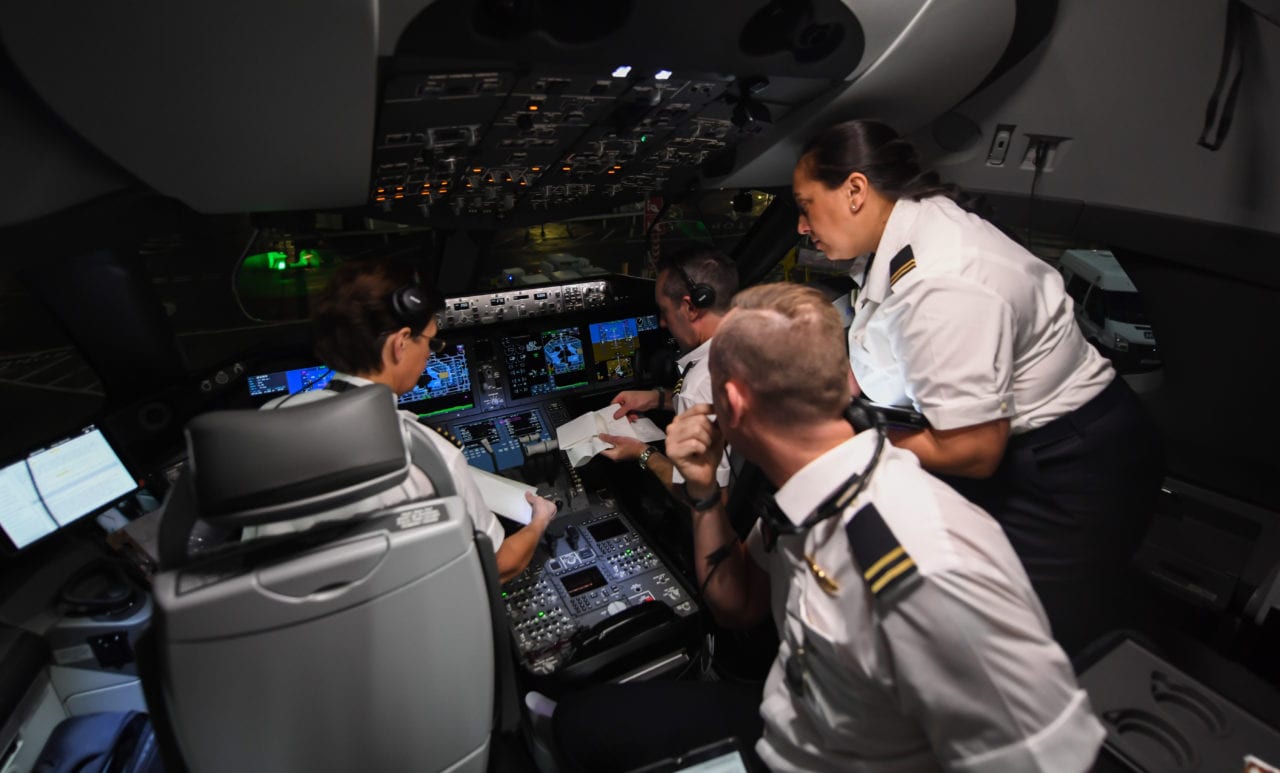
Despite suffering a $1.9 billion loss during the second half of its fiscal year 2020, Qantas will resume its ambitious “Project Sunrise” initiative once its balance sheet allows, CEO Alan Joyce said during an Aug. 20 earnings call. Pictured here, are pilots onboard a Boeing 787-9 from a November 2019 Project Sunrise research flight.
Quantas is unlikely to resume international flying until July 2021, CEO Alan Joyce said during the Australian carrier’s Aug. 20 conference call. The company reported a $1.9 billion loss under the impact of the COVID-19 pandemic for the financial year that ended in june. Joyce also said the carrier’s Project Sunrise is temporarily on hold – but not cancelled.
During the first six months of the year, Qantas experienced a 91 percent drop in profit compared to the same period in 2019. As a result, their fleet of Boeing 747s have been retired six months ahead of schedule, the A380 fleet is being held in “long-term storage” in the United States and they’re on track to reduce their workforce by 6,000 employees, or 20 percent of the entire organization.
“That’s the sad reality of what the pandemic means for airlines – far fewer employees, at least for a while,” Joyce said. “Some carriers are shrinking their workforce by 30, 40 percent. Some may not survive at all.”
Project Sunrise is a research project that Qantas has been evaluating for three years, challenging both Airbus and Boeing to field an aircraft capable of serving three of the world’s longest non-stop routes: Brisbane to Paris, Melbourne to New York and Sydney to London. After completing two Project Sunrise research flights–New York to Sydney and London to Sydney – using newly delivered Boeing 787-9s last year, the airline ultimately announced in December 2019 that the A350-1000 was its preferred aircraft for the routes if the project were to proceed.
On Thursday, Joyce, confirmed the future of Project Sunrise.
“Hard decisions in the current climate are largely about survival – and also about eventually being able to grow again,” Joyce said.
“Coming out of this crisis, we’ll be the only Australian airline that can fly long haul. We want to expand on that when our balance sheet allows, picking up where we left off with Project Sunrise,” he added.
In June, Qantas started to see passenger demand come back domestically, even re-deploying some grounded Airbus A320s and launching new routes such as Sydney to Ballina and Orange. In Singapore, Jetstar, the carrier’s regional subsidiary brand, reduced its operational fleet and workforce by more than 25 percent.
The Qantas Group also completed the sale of its 30 percent shareholder stake in Vietnam-based Jetstar Pacific. A total of 100 aircraft within the Qantas fleet have been shifted to storage in a state “that significantly reduces the need for ongoing maintenance,” the airline said in a statement.
A representative for Qantas told Avionics International in an emailed statement that the airline stopped offering Internet access on domestic flights to reduce operational costs. That policy began in April, although changes have recently been implemented according to the airline’s website.
“Yes that’s correct we’re not offering Wi-Fi on our domestic aircraft. It’s also due to the fact that we’re also operating a significantly reduced network,” the representative said.
An updated statement has since been posted to the Qantas website noting the their “free In-flight Wi-Fi is being progressively switched back on across our domestic B737 fleet, in partnership with Viasat.”
Joyce did not give a projected restart date for Project Sunrise during the earnings call.